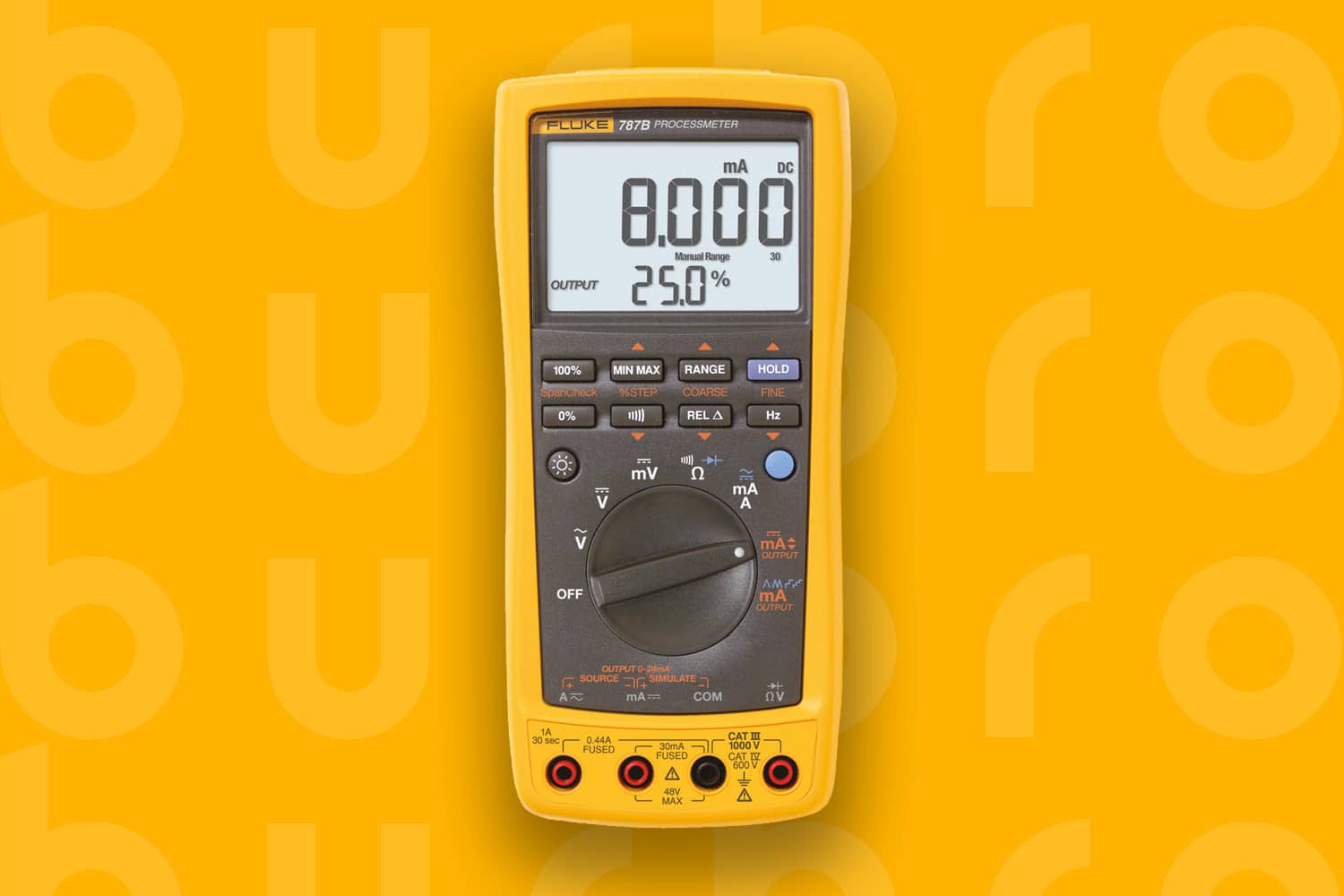OUR EDITORS INDEPENDENTLY RESEARCH, SELECT, AND RECOMMEND THE BEST PRODUCTS FOR REVIEW. AT TIMES (AND AT NO EXTRA COST TO YOU), WE MAY RECEIVE COMMISSIONS ON PURCHASES MADE THROUGH OUR CHOSEN LINKS. WE WILL ONLY EVER PROMOTE THE PRODUCTS AND SERVICES THAT WE TRUST AND 100% RECOMMEND. YOU MAY READ OUR FULL AFFILIATE DISCLOSURE POLICY FOR MORE INFORMATION.
Table of Contents
- Best Multimeters in 2024
- 1. Fluke 87V Digital Multimeter
- 2. Klein Tools MM600 Multimeter
- 3. Fluke 117 True RMS Multimeter
- 4. Fluke 115 Compact TRMS Multimeter
- 5. Extech Ex355 Professional Multimeter
- 6. Amprobe AM-530 TRMS Multimeter
- 7. AstroAI TRMS 6000 Digital Multimeter
- Multimeter Buying Guide
- Summary – Best Multimeter for 2024
Best Multimeter 2024 – Updated by Burbro Editors on April 14th, 2021
Whether you need to test an outlet for electricity or test fuses to see if they’re blown, there’s always a need for a good multimeter. These tools can be handy if you need to test and measure the electrical currents and require feedback for the calculated resistance and voltage in a wire or electrical outlet.
If you’ve been looking for multimeters, you’ll notice that there are a lot of options that you can choose. However, this doesn’t mean that all multimeters are right for the job you need. Some multimeters are ideal for home DIY projects, while others are intended to be used by electricians and mechanics.
In this review, we’re going to look at the best multimeters in 2024. We’ll also provide a buying guide that shows you what to look for when you’re buying a multimeter to choose the right one for your job.
Best Multimeters in 2024
If you’re looking for a high-quality multimeter, then you’ve come to the right place. In this section, we’ll be reviewing multimeters and showing you some of the top ones that you can use. We’ve also compiled a shortlist of the top products to quickly find what you’re searching for and get back to your life.
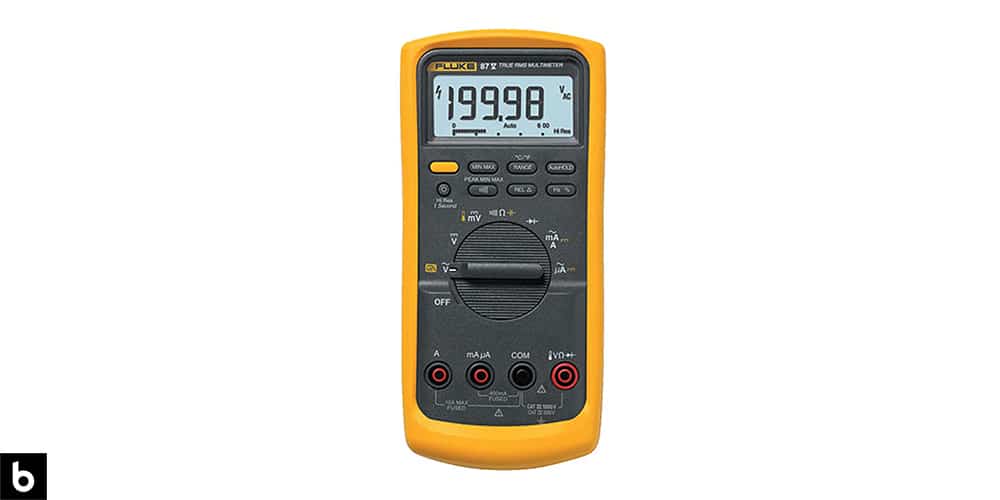
1. Fluke 87V Digital Multimeter
The Best HVAC Multimeter
If you’re looking for a high-quality multimeter built to last, you’ll be interested in the Fluke 87V Digital Multimeter. The Fluke 87V DMM features an analog bar graph to visualize your readouts while having the digital screen so that you can track micro-changes, which may be challenging to see with the analog interface. The Fluke 87V DMM comes with a CAT lll 1000V / CAT IV 600V safety rating and can measure up to 1000V AC/DC, 10 amps current AC/DC, and 50 Megaohms of resistance. This tool is also able to measure capacitance, frequency, temperature, and duty-cycle. With the Fluke 87V DMM, you’ll have a multimeter that’s built to last. This tool comes with a rugged design that’s waterproof and resistant to drops from up to 4 meters, which means you’ll be able to use it on ladders. This tool is also built to operate in extreme temperatures and can operate in conditions of -20C to +55C without any failures. One of the things we love about the Fluke 87V DMM is that it comes with a lifetime warranty that gives you the maximum protection for your purchase. It’s also nice to know that a brand stands behind its product by offering an extended warranty for their tools.
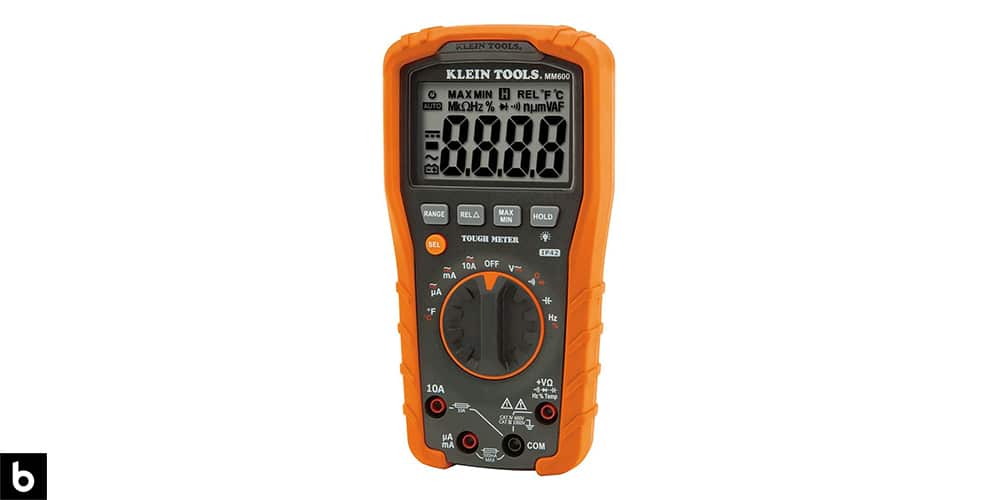
2. Klein Tools MM600 Multimeter
The Best Multimeter for Home Use
If you’re looking for the best multimeter for home use, you’ll want to take a look at the MM600 Multimeter by Klein Tools. This multimeter is built with quality and has many features that you’d find inexpensive multimeters, except without the price tag attached to the tool. The Klein Tools MM600 Multimeter features a CAT IV 600V / CAT lll 1000V safety rating and can measure up to 1000V AC/DC voltage, 10A current and 40 Megaohms resistance. It’s also able to track temperature, capacitance, frequency, duty-cycle, and continuity. This multimeter can withstand drops of up to 2 meters and is equipped with a heavy-duty protective casing. It also comes with a low battery signal and an accessible battery compartment on the back of the device. With the MM600 Multimeter, you’ll enjoy a 5-year warranty from Klein Tools, which is a nice feature. We love that they stand behind their product with a long-term warranty, especially since this is a cheaper multimeter.
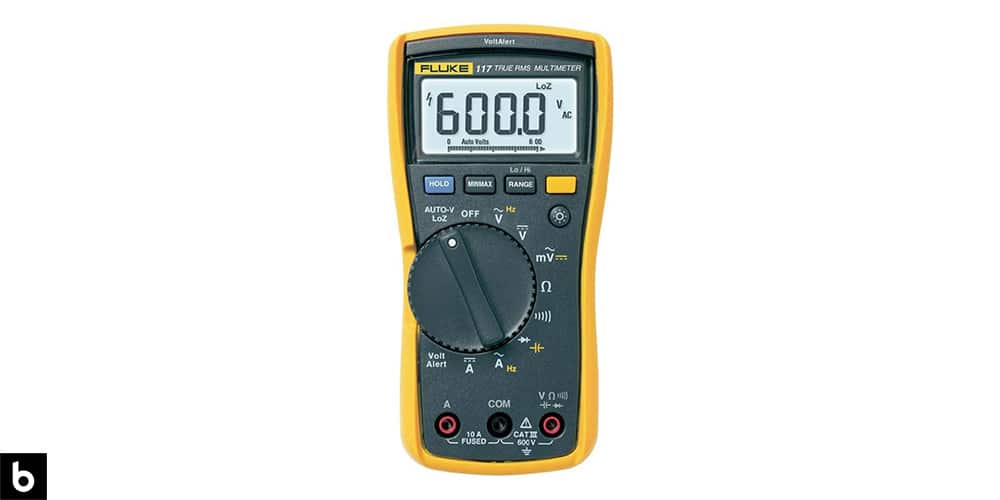
3. Fluke 117 True RMS Multimeter
One of the Best Multimeters for Electricians
If you’re an electrician or you’re taking your electrical apprenticeship, you’ll need to find a high-quality multimeter for your work pouch. One of the best multimeters for electricians is the Fluke 117 True RMS Multimeter and even comes with an analog bar graph so that you can visualize the spikes in currents. The Fluke 117 True RMS Multimeter comes with a CAT lll 600V safety rating and can measure up to 600V AC/DC, 10 amps current AC/DC, and 40 Megaohms of resistance. It’s also capable of measuring Capacitance, Frequency, Continuity/ Diode, and low input impedance. One of the many things we love about the Fluke 117 True RMS Multimeter is that it comes with the ‘hold measurement’ feature that allows you to freeze the readout for accurate readings. It also comes with a built-in LED light, making it easier for electricians to work in a poorly lit environment. With the Fluke 117 TRMS Multimeter, you’ll also enjoy a 3-year warranty from the manufacturer. This long term warranty will add a buyer’s protection and ensure that you get a tool that’s free of any defects from the factory.
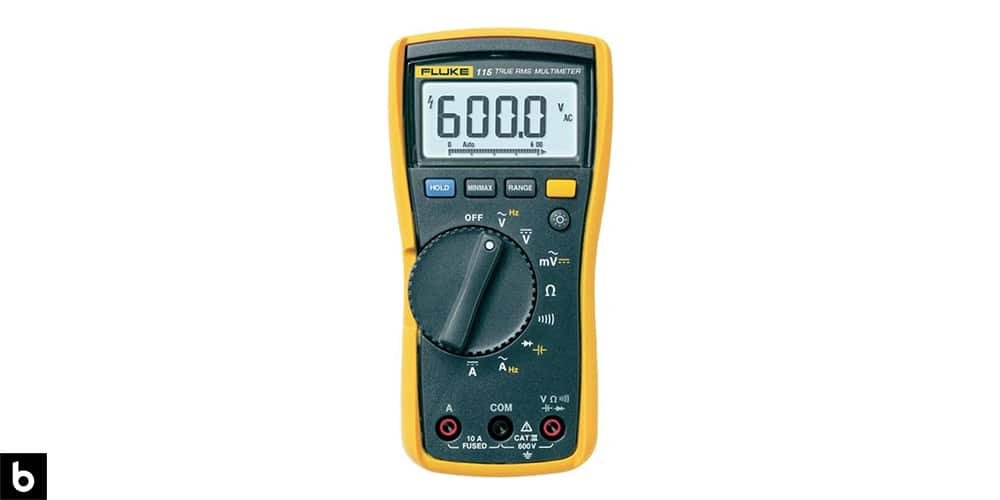
4. Fluke 115 Compact TRMS Multimeter
One of the Best Multimeters for Cars
If you’re a mechanic or you like to work on project cars, you may need a multimeter to test the wiring on the cars. One of the best multimeters for auto mechanics is the Fluke 115 Compact TRMS Multimeter. The Fluke 115 TRMS Multimeter comes with a CAT lll 600V safety rating and can measure up to 600V AC/DC, 10 amps current AC/DC, and 600 Ohms. It can also measure resistance and continuity, frequency, capacitance, low input impedance and diode tests. With the Fluke 115 TRMS Multimeter, you’ll be able to enjoy a 3-year warranty that protects you from faulty tools. This device is also compact, ideal for home use or field technicians that don’t have room in their service trucks for larger multimeters.
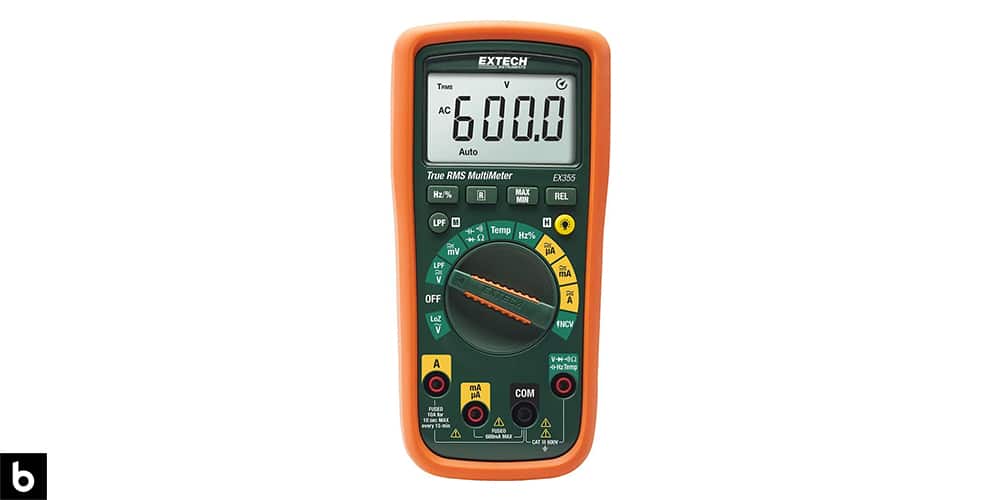
5. Extech Ex355 Professional Multimeter
One of the Best Multimeters for Professionals
If you’re still looking for a high-quality multimeter, then you may be interested in the Extech Ex355 Multimeter. While this is an inexpensive multimeter, it has many advanced features that you’ll need if you’re a pro at using multimeters. The Extech Ex355 Professional Multimeter comes with a CAT lll 600V safety rating and can measure up to 600V AC/DC, 10 amps current AC/DC, and 60 Megaohms of resistance. It can also measure Capacitance, Frequencies, Temperature, Duty-Cycle, Continuity, and Diode Tests. With the Extech Ex355 Multimeter, you’ll quickly see your readouts with the large backlit digital screen. It also comes with the data hold feature that lets you freeze your readings for convenient reading and recording. You’ll also be able to track the extreme readouts with the Min/Max features, which record the highest and lowest numbers that were tracked.
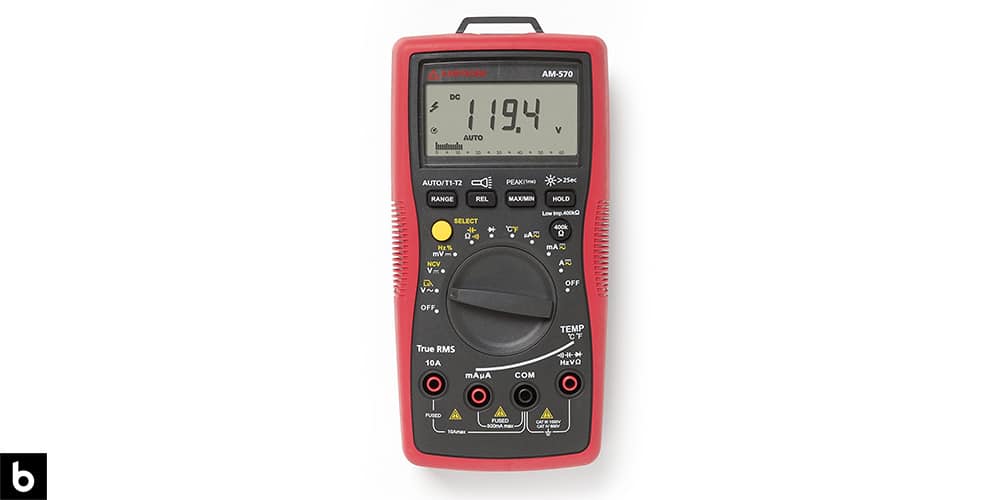
6. Amprobe AM-530 TRMS Multimeter
One of the Best Multimeters for Home Use
If you’re a homeowner and like to have DIY projects around the house, you may need a multimeter to test outlets, appliances, or your car. One of the best multimeters for home use is the Amprobe AM-530 TRMS Multimeter. The Amprobe AM-530 TRMS Multimeter comes with a CAT lll 600V Safety rating and can measure up to 750V AC and 1000V DC, 10 amps current AC/DC, and 40 Megaohms of resistance. It can also measure capacitance, frequencies, and temperature. The Amprobe AM-530 also comes with non-contact detection, which can detect electrical currents without touching the wires. This makes it one of the best multimeters for beginners because you’ll keep yourself safe from touching live wires. One of the things we like about this multimeter is that it comes with an analog bar graph, making it easier for you to visualize the spikes in currents. It also comes with a built-in LED flashlight, which keeps you safe in poorly lit workspaces.
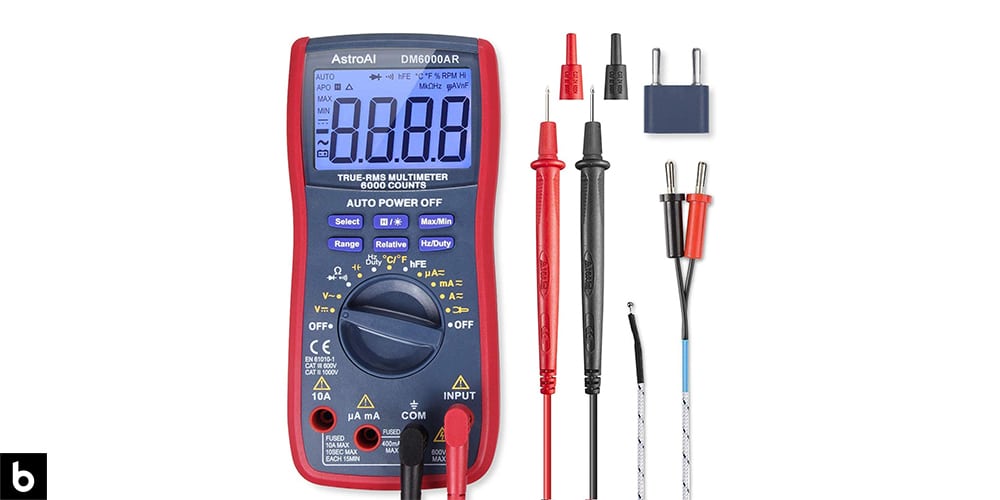
7. AstroAI TRMS 6000 Digital Multimeter
One of the Best Cheap Multimeters
If you’re shopping on a budget, you’ll want a cheap multimeter, such as the AstroAI TRMS 6000 DMM. While some cheaper tools may not last, this device was built with durability in mind. The AstroAI TRMS 6000 Digital Multimeter comes with a CAT III 600V / CAT II 1000V safety rating and can measure AC/DC Voltage, AC/DC Current, Resistance, Continuity, Diode, Capacitance, Temperature and Frequency. With the AstroAI TRMS 6000 DMM, you’ll also easily see your readouts with the lard LCD screen that comes with backlighting so that you can see in dimly lit workspaces. It also comes with the ‘data hold’ feature, which allows you to hold and record the readout for easier recording.
Multimeter Buying Guide
We want you to choose the right multimeter for your job, so we’ve created a comprehensive buying guide to help you find the right tools for the job. In this buying guide, we’ll walk you through the different features that you may need in your multimeter.
If you’re new to owning a multimeter, then you may find that this guide is especially helpful for you.
Who Should Use a Multimeter?
Before we go any further, you may be wondering if you need a multimeter or if you’re even qualified to operate a multimeter. While you don’t need to have any degrees or certificates to use a multimeter, you’ll want a basic understanding of how electricity works so that you’ll be able to read the data that the tool can provide.
There are many uses for a multimeter, including DIY house maintenance, HVAC system installation, mechanics and certified electricians. You may need a multimeter for any other projects such as testing batteries or extension cords, checking older light bulbs, spot hot wires, or finding a faulty switch.
Whatever your reason is for owning a multimeter, there’s always a lot of ways to put your multimeter to use. While you may not require a heavy-duty multimeter, it’s not bad to have one in your home or workplace.
How to Choose the Best Multimeter
In this section of our multi-meter review, we’re going to show you some of the things that you should look at when choosing a multi-meter. While we’ll be covering the various features that can come with a meter, it doesn’t mean that you’ll need all of the bells and whistles on your multi-meter.
Before we get started, you’ll need to know your meter’s intended purpose so that you can choose the right tool for the job. By understanding the intended use, you’ll also be able to save money on your multi-meter by selecting a device that only has the features that you require for your job.
While you’ll be able to choose a fancy multi-meter, there’s little sense in doing so if you’ll only be using a couple of the primary features.
Here are some features to consider when choosing a multi-meter.
1. Digital Multimeter or Analog Multimeters
Before you purchase a multimeter, you’ll need to determine whether you’d like to have a digital interface or an analog interface. While both of these interfaces work, most people have a strong preference for one or the other.
Some people prefer to have an analog interface instead of the digital interface because they believe that it allows them to have better readouts and visualize the changing trends of the electrical currents.
Like a speedometer, you’ll be able to see the ‘pointer’ change its location as there are changes in the electrical currents. When you’re using an analog interface, you’ll be able to see these spikes because the ‘pointer’ will jump around. However, with a digital interface, you won’t be able to see these random changes as clearly because the numbers will change so quickly that you won’t be able to read the numbers.
On the other hand, many people prefer to use the digital interface because it allows them to accurately read the minor changes in amps, voltage and ohms. When you’re using an analog interface, you may not see the lower input impedance because the higher the input, the easier it is to see the changes and read them out with an analog interface.
However, with the digital interface, you won’t have any issues with readouts for micro-changes because the digital multimeters are excellent at being sensitive to even the smallest changes in electrical currents.
While the choice between digital and analog multimeters is yours to make, we recommend that you choose a digital multimeter that comes with a bar graph display to digitally record the micro changes while being able to visualize the larger spikes with a digital bar graph.
2. Type of Electrical Current (AC/DC)
When you’re using a multi-meter, you’ll need to be aware of the type of electrical currents that you’re trying to measure. There are two types of electrical currents that you can measure with a multi-meter: the Alternating Currents (AC) and the Direct Current (DC).
- Alternating Currents (AC) – The alternating current refers to the electricity that is continuously flowing back and forth in both directions. The alternating currents can be found in power sources for your home and household appliances such as your refrigerator, dishwasher and toasters.
- Direct Current (DC) – The direct current refers to the electrical currents that are continuously flowing in one direction. You’ll find DC currents in almost all handheld devices, battery-powered items, hybrid cars or even flat-screen TVs.
While most meters will measure both of these currents, not all of them have this ability. You’ll need to be careful when choosing your multi-meter to ensure that it’s able to measure the correct electric currents.
3. Auto Ranging or Manual Ranging
While choosing a multimeter for your job, you’ll need to determine if you’d like to have automatic ranging or manual ranging. This feature will come down to your preferences; however, it’s easier to use the auto-ranging multimeters.
With an auto-ranging multi-meter, you won’t need to input the ranges before you begin testing. This is because the multimeter is designed to recognize the type of project that you’re working on and output the right measurements.
If you choose a manual ranging multi-meter, you’ll need to know a lot more information about your projects such as the resistance, voltage, capacity and other values. You’ll need to use this information to set the right ranges for testing manually, or else you won’t be able to get any readout from your machine.
4. Choose the Measurements
You’ll also need to be mindful of what you’re trying to measure before you buy a multimeter. Almost all multimeters can measure the basics such as voltage, electrical currents and resistance. These measurements can be calculated by the volts, amps and ohms.
However, unless you have a higher-end multimeter, you may not have the ability to take other measurements. Some of the more expensive multimeters will measure temperatures, continuity, frequencies, resistance, and capacitance. While you may not need a tool that can find these measurements, you’ll need to know what you’ll use the multimeter for before you purchase so that you can find a device that fits your needs.
5. Select the Inputs
With the cheaper multimeters, you’ll likely only have two ports that can be used to attach your probes to the machine. These ports are often referred to as the common and the input. On these devices, the input will be used to measure all the currents, which can be dangerous if the levels of electricity are quite different.
When you’re using a multimeter that only has one port for the input, you’ll need to pay close attention to the settings that you’re using, so that you don’t measure a current that’s too powerful for the machine and cause damage to the multimeter.
If you choose a higher-quality multimeter, the machine should come equipped with multiple ports that can be used for different measurements. One input may be used for the currents, while the other input is used to handle the resistance and voltage measurements. This is safer than using a single input machine because it helps eliminate the chances of accidents happening while you use the meter for testing.
6. Other Multimeter Features
There are many things that you should look for when choosing the right multimeter; however, there are additional features that you may want. While these features may not be essential, they can make your machine last longer and make it easier for you to operate your multimeter.
Here are some additional features that you may want to consider.
- Probes – When choosing a multimeter, you’ll want to ensure that you select the right probes. Some common types of probes include Alligator Clips, IC Hooks, Tweezers, and Test Probes. You’ll also want to make sure that the handles come with protective bars that prevent your fingers from touching the metal probes and shocking yourself.
- Measurement Holds – If you’re using a digital multimeter, you may want the measurement hold feature, which allows you to test the currents and then press the ‘hold’ button, and that specific measurement will be frozen on the screen. This will help you remember the readout numbers accurately throughout your testing.
- Measurement Ranges – You’ll also want to pay attention to the range of your multimeter. If you’ve purchased a meter meant for residential outlets, it may not have the range for higher power outlets. If you’ll be using your multimeter for a variety of uses, then it’s best to choose a machine that has a wide measurement range.
- Size and Build – When it comes to multimeters, there are many sizes that you can choose. You could go with a larger heavy-duty machine or a pocket meter for quick testing. You’ll also want to pay attention to the multimeter’s build to ensure that it’s durable and comes with a protective casing to protect it from falls.
- Sound Alerts – Some multimeters come with sound which alerts you when the machine is sensing some electrical currents. This is a nice feature to have if you’re quickly testing a wall outlet or some batteries.
- Built-in Lights – There’s nothing worse than trying to figure out electrical issues in the dark. By working in the dark, you not only complicate your project, but it can be dangerous if you’re working with open wiring. One way to prevent this is by choosing a multimeter that comes with a built-in LED light that can be used to illuminate your workspace.
- Price Range – If you’re looking for the best multimeter, you’ll notice that there’s a wide price range for these tools. While there’s a wide range of prices, it doesn’t mean that you won’t be able to find a multimeter that’s suited for your job. We recommend setting a budget so that you can find the best multimeter within your price range.
While there may be other features that you’d like to have in your multimeter, these are some of the most common and useful features that you’ll be able to find equipped on a meter.
7. Choose a Warranty
As with any large purchase, you’ll want to ensure that you get a warranty to protect yourself if there’s an issue with your product. Since multimeters can cost hundreds of dollars, it’s wise to choose a brand that offers an extensive warranty on their products and tools.
We recommend that you choose a multimeter with a warranty that lasts for at least one year to ensure that you get the most buyer’s protection for your money. If you prefer more extended warranties, then you may be interested in the Fluke Multimeters because they come with 3-year to lifetime warranties.
Summary – Best Multimeter for 2024
We hope that this review has helped you on your journey to find the best multimeter for your project. If you’re new to owning a multimeter, you may wish to use our buying guide to find the perfect multimeter for your job.
Remember to shop within your budget so that you find the best multimeter in your budget, and look for warranties whenever you make a large purchase to ensure that you have the maximum buyer’s protection from faulty tools.
